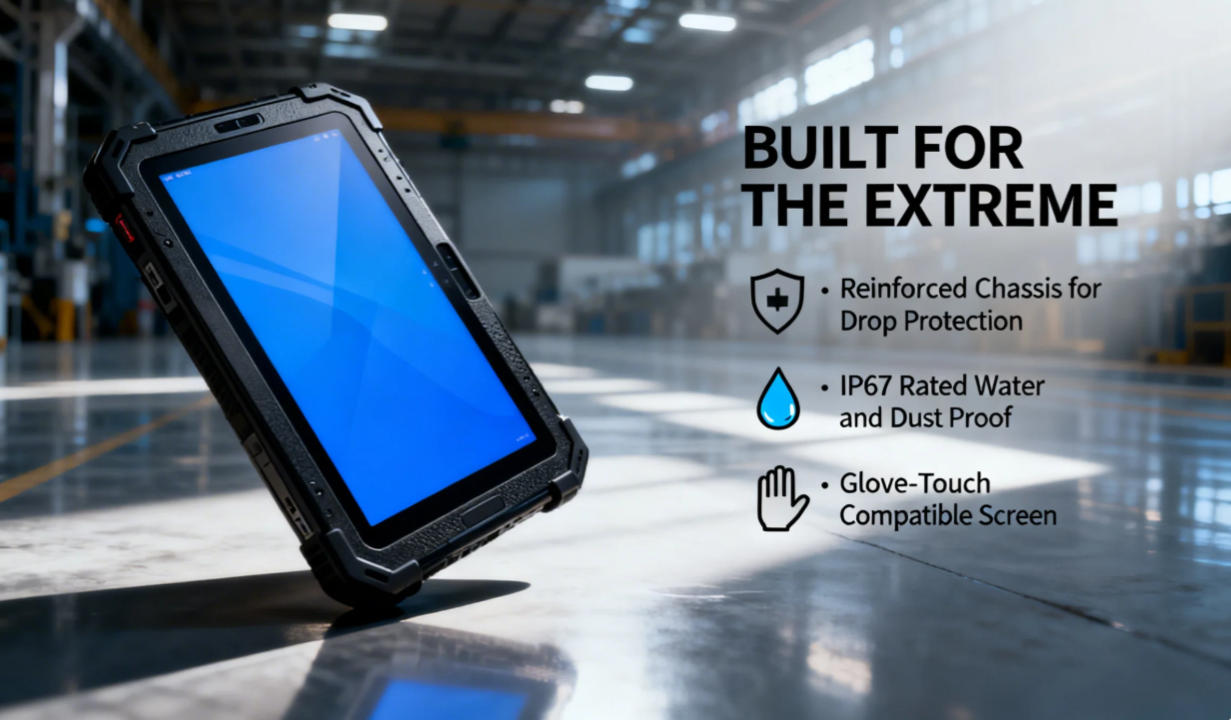In industrial settings, efficiency, durability, and reliability are crucial. That’s where rugged Linux tablets for industrial use step in. These devices are specifically designed to handle the harsh environments often found in industries like manufacturing, transportation, construction, and more. Unlike standard consumer tablets, rugged tablets are built to withstand extreme conditions while providing seamless software performance, largely thanks to the Linux operating system. But what exactly makes them ideal for industrial use, and why is Linux often the preferred OS?
Rugged Linux tablets are engineered to be more resilient, with hardened exteriors that can endure drops, vibrations, dust, water, and extreme temperatures. They also leverage Linux’s flexibility, offering a wide range of software customizations to meet the specific needs of industries. By combining hardware toughness with the software’s adaptability, these tablets deliver the perfect balance of durability and functionality.
Benefits of Rugged Linux Tablets for Industrial Use
The primary advantage of rugged Linux tablets lies in their ability to perform in the toughest conditions, but that’s not all. They also offer several unique benefits:
- Durability and Resistance: Built to endure physical stress, rugged tablets are IP-rated, meaning they can resist water and dust penetration. They are also drop-tested to military standards, ensuring they survive falls and impacts common in industrial environments.
- Software Flexibility with Linux: Linux, being open-source, allows for a wide range of customization. Industrial users can tailor the software to specific operational needs, ensuring better performance and adaptability.
- Enhanced Security Features: Industrial data is often sensitive. With Linux’s robust security features, including user permission settings, encryption, and secure boot options, businesses can rest assured that their data is safe.
Industries That Benefit from Rugged Linux Tablets
Several industries have seen productivity gains by integrating rugged Linux tablets into their operations. Here’s a breakdown:
- Manufacturing: These tablets are ideal for real-time monitoring of production lines, controlling machinery, and performing quality control checks.
- Transportation and Logistics: Rugged Linux tablets enhance fleet management and tracking, offering real-time data on shipments and vehicle diagnostics.
- Construction and Mining: In environments where equipment is subject to dust, shock, and extreme temperatures, rugged tablets can endure and function optimally, providing workers with necessary data for on-site decisions.
- Agriculture: Farmers use these tablets to manage crop data, control irrigation systems, and monitor weather patterns, ensuring optimal yields.
Key Features of Rugged Linux Tablets
Several key features distinguish rugged Linux tablets from their consumer counterparts:
- IP Rating and Water/Dust Protection: An IP rating is a certification that shows a tablet’s resistance to dust and water. A rating of IP67, for example, means the device is dust-tight and can withstand immersion in water.
- Impact and Drop Resistance: Rugged tablets are drop-tested to military standards, ensuring they survive in rough handling scenarios.
- Long Battery Life: Industrial workers often need their devices to last throughout long shifts. Rugged tablets typically come with extended battery life, and some models even offer hot-swappable batteries for continuous use.
- Sunlight Readability: Outdoor environments can make screen visibility a challenge. Many rugged Linux tablets come with sunlight-readable displays, allowing workers to use the device in bright sunlight without issue.
How Rugged Linux Tablets Enhance Productivity
The use of rugged Linux tablets in industrial settings significantly boosts productivity:
- Streamlining Operations in Harsh Environments: These devices allow seamless operations even in the most challenging conditions. Workers can monitor machinery, collect data, and control processes without worrying about damaging the device.
- Real-time Data Collection and Monitoring: Rugged tablets provide real-time data, allowing for quick decision-making and troubleshooting. This level of insight is invaluable for industries that require constant supervision, such as logistics and manufacturing.
Linux OS Advantages for Industrial Use
The Linux operating system is favored in industrial applications for several reasons:
- Open-Source Flexibility: Being open-source means Linux can be customized to meet the specific needs of an industry or operation.
- Scalability and Customization: Whether you need a lightweight OS for simple data collection or a robust system for complex automation tasks, Linux can scale to your needs.
- Cost-Effectiveness: Unlike proprietary operating systems, Linux doesn’t require licensing fees, making it a more affordable option for businesses looking to scale their technology infrastructure.
FAQs About Rugged Linux Tablets for Industrial Use
- What is the typical lifespan of a rugged tablet?
- Rugged tablets are built to last, with most devices having a lifespan of 3-5 years, depending on usage and maintenance.
- Can rugged Linux tablets run Windows applications?
- While Linux tablets do not natively run Windows applications, many Linux distributions support compatibility layers like Wine to run Windows programs.
Latest Content
- School Bus Rugged Tablet Success Case: Transforming Student Transportation with Intelligent Fleet Technology
- Top 10 Rugged Tablet Manufacturers & Supplier Worldwide in 2026 (Updated 2026)
- 7 Inch Rugged Vehicle Tablet: 2026 Complete Guide (Latest Specs, Applications, ROI Data & Implementation Framework)
- How Industrial Android Platforms Are Selected:A Partner’s Perspective on Integration, Stability, and Scale
- What is Hours of Service (HOS)?
Tags: embedded linux tablet, Heavy-duty tablet for industrial applications, Industrial-grade Linux tablet, Linux tablet, Linux tablet for harsh environments, rugged industrial tablet, Ruggedized tablets with Linux OS









